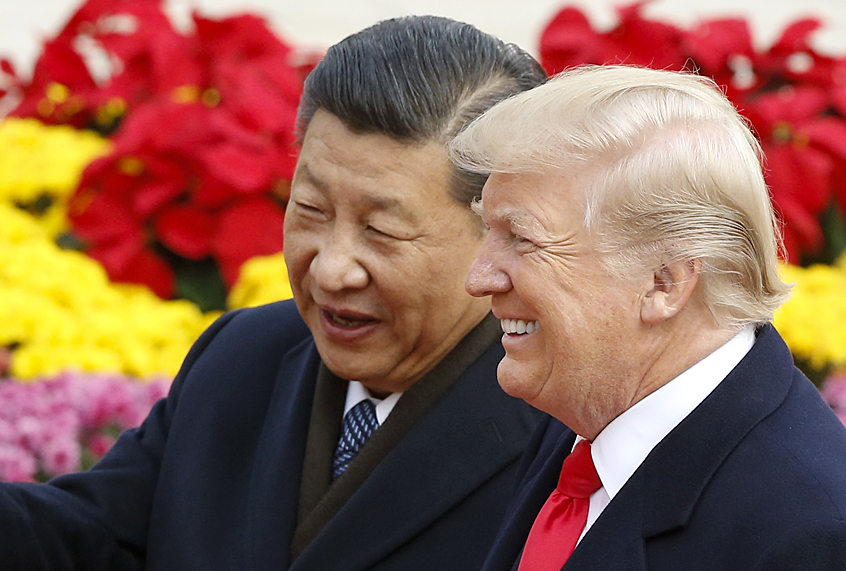While most Americans are focusing on Russia’s attack on American democracy during the 2016 presidential election, one CIA official is warning that a different type of cold war is being waged from another competing superpower — in this case, China.
“I would argue… that what they’re waging against us is fundamentally a cold war — a cold war not like we saw during THE Cold War (between America and the Soviet Union from 1945 to 1991), but a cold war by definition,” Michael Collins, deputy assistant director of the CIA’s East Asia mission center, told an audience at the Aspen Security Forum in Colorado, according to the Associated Press. As one example, he pointed to the Chinese construction of military outposts on islands in the South China Sea, a development he referred to as “the Crimea of the East.”
The Crimea reference is an allusion to how Russian President Vladimir Putin annexed Crimea from Ukraine in 2014.
Collins also explained that “at the end of the day they want every country around the world, when it’s deciding its interests on policy issues, to first and foremost side with China and not the United States, because the Chinese are increasingly defining a conflict with the United States and what we stand behind as a systems conflict,” according to CNN. He pointed to the recent enshrinement of the writing of Chinese President Xi Jinping into that nation’s constitution as evidence of the threat posed by the country, arguing that “it sets up a competition with us and what we stand behind far more significantly by any extreme than what the Russians could put forward.”
A piece by The New York Times in February elaborated on the tenets of Xi’s “thought,” which is now held as central to China’s nationalist understanding of itself in a manner analogous to the thought of Chinese Communist revolutionary Mao Zedong:
“Never before have the Chinese people been so close to realizing their dreams,” Mr. Xi is often quoted as saying. Implicit in the dream of being counted among the world’s powers is the idea of China nearing the United States in strength and influence.
Boiled down, the doctrine is a blueprint for consolidating and strengthening power at three levels: the nation, the party and Mr. Xi himself…
To sustain China’s global rise, Mr. Xi is modernizing China’s military and investing heavily in a $1 trillion international trade initiative known as Belt and Road. Under Mr. Xi, China has expanded the size and scope of its military, purged corrupt officers and built military installations in contested waters of the South China Sea…
Xi Jinping Thought promotes the supremacy of the Communist Party to growing numbers of avid consumers, internet users and world travelers — a group fundamentally different from the workers and peasants who were supposed to be the soul of the Communist Revolution.
Mr. Xi’s philosophy teaches that the goal of a powerful, unified China can be achieved only if the Communist Party stays firmly in control of China. The party, he says, is the solution to China’s problems, not their source…
Central to the doctrine is the idea that for China to continue its global rise, and for the party to maintain its rule, a decisive leader is needed at the helm. And the man for the job is Mr. Xi.
Xi Jinping Thought was seen in action this week when the Communist Party announced it would abolish presidential term limits, allowing Mr. Xi to remain in power, perhaps indefinitely.
Collins’ comments came on the heels of a similarly dire observation from FBI Director Christopher Wray earlier this week. Wray noted that his bureau has economic espionage investigations active in all 50 states that can in one way or another be traced back to China. As he told the AP, “The volume of it. The pervasiveness of it. The significance of it is something that I think this country cannot underestimate.”
China has been accused of a number of economically aggressive actions, from attempting to steal business secrets and technological and academic research from American companies to developing increasingly advanced weapons, such as long-range cruise missiles that are capable of reaching supersonic speeds.
China has also been criticized by President Donald Trump for its trade policies toward the United States and has imposed new tariffs on Chinese imports as a way of rectifying what he has claimed is an inequality. This policy has fueled concerns that America might soon find itself in the middle of a trade war.
“Well, the threat has huge potential implications for the American economy, particularly for the agricultural sector,” Ed Gerwin, a senior fellow for trade and global opportunity at the Progressive Policy Institute, told Salon in April. “Because, as you know, farm prices move based on threats to the global economy, opportunities in the global economy. And all of this saber-rattling with respect to tariffs I think is particularly troublesome for the farm sector. One of the problems is that we are talking about imposing tariffs on products that come from China, that in many instances are made from components from all over the world — the standard example being the iPhone, which really has relatively little Chinese content.”
Former Sen. Joe Lieberman, D-Conn., also expressed concern to Salon about the long-term implications of Trump’s belligerent trade policies not only toward China but other American trading partners as well.


